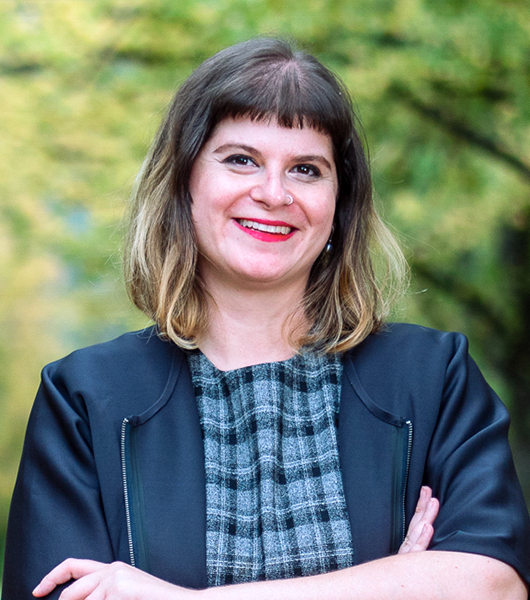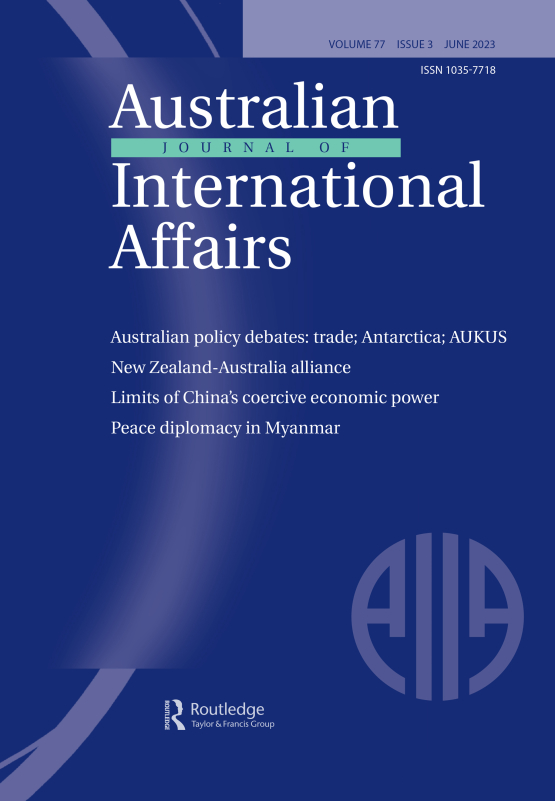Meet the Author:
Ntina Tzouvala
Ntina Tzouvala is an Associate Professor at the School of Global and Public Law, UNSW Faculty of Law & Justice, and author of Australian Journal of International Affairs. Her work focuses on the history, theory and political economy of international law. She is especially interested in historical materialism, deconstruction, feminist and queer legal theory. Between 2019 and 2021 Ntina was a founding member of the editorial collective of the Third World Approaches to International Law Review. In early 2020, she was appointed Senior Advisor to the UN Special Rapporteur on the Right to Food.
In this insightful Q&A, we dive in deeper about her article “International law as a discipline in crisis”, where it approaches the current fractures in international law not just as cause for concern, but as an opportunity for critical renewal. Ntina discusses how the profession’s divided response to recent global events signals a deeper identity crisis within the field. Drawing on critical theory and political economy, she challenges conventional groupings within the discipline and calls for a rethinking of legal frameworks to better confront inequality, structural bias, and global injustice.
Ntina published her article Open Access (OA) making it free to read for all. She was able to do this through the CAUL agreement, between Taylor & Francis and Australia & New Zealand institutions, which you can read more about here.

Your article tackles some of the deepest tensions in international law today, particularly around how we define and respond to global crises. To begin, can you tell us what inspired you to write this article?
Since October 2023, I have watched in horror and disbelief as Israel has been engaging in a systematic campaign of destruction against Palestinians in Gaza. At the same time, I have been observing my own discipline, international law. What became obvious soon enough was that my colleagues were divided into two camps.
On the one hand, many international lawyers treat the annihilation of Gaza as a technical legal matter amongst many others. On the other hand, some of us consider this to be an issue of existential significance not only for international law but also for the international order as well as, closer to home, for our field as a disciplinary endeavour. My article attempts to situate this disciplinary division within a longer discussion about international law’s preoccupation with crises. My main argument is that, in contrast to previous historical moments, currently international lawyers cannot even agree on what constitutes a crisis, which seems like an important development insofar as scholarly fields tend to share some common starting points.
You suggest that the shared worldview once holding international law together has now fractured. What new possibilities or risks do you see emerging from this crisis of identity?
One of the most notable aspects of the current moment has been that the two ‘camps’ that I described above do not correspond neatly to previous methodological or ideological demarcations within the field. My own work draws from various aspects of critical social theory and heterodox political economy to critique international law. And yet, when it came to the destruction of Gaza, I often found myself in agreement with formalists, analytical philosophers, or even (few) liberal internationalists. In contrast, a non-insignificant number of critical legal scholars have remained silent or have been equivocating about the destruction of the Palestinian people. To me, this is a good indication that previous disciplinary groupings and demarcations have become at least partly outdated. The best-case scenario, in my mind, is that this moment of crisis will shock all of us to abandon our habits of thought and ask new, more rigorous questions about our field.
Your article contrasts response to Russia’s invasion of Ukraine and Israel’s war on Gaza – not just as inconsistent but pointing to a deeper pattern of systemic complicity in how international law operates. What are your reflections on this disparity, and what would reimagining international law for equal justice look like?
Even before I researched this question in detail, I knew that this disparity was glaring, but the details surprised me: Western professional societies (notably, the European Society of International Law) (rightly) condemned Russia’s aggression against Ukraine; leading journals of the field (such as the American Journal of International Law) published special issues and editorials on Russia’s affront against the international legal order; major conferences of the field devoted whole panels and sessions to the events. In contrast, until the solidly critical London Review of International Law published a series of critical reflections in mid-2024, no major Anglophone journal had treated this genocidal war as important enough to disrupt its regular articles’ pipeline.
Being a critical international lawyer, I do not think that the main problem of international law is the double standards in its application. Rather, I believe that even if applied perfectly consistently, international law would still structurally disadvantage some groups to the benefit of others. Racism, imperialism and pro-capitalist biases are baked into the rules and Palestinians face structural barriers in their struggle for self-determination, freedom and justice. This structural critique though does not mean that we should ignore what is in front of our own eyes: many international lawyers do not value the life and freedom of all peoples equally and, if they do in theory, they are not willing to confront their governments or their employers to make that point.
You quote Polanyi: “the true nature of the international system under which we were living was not realized until it failed.” Why do you think it takes a system’s collapse for it to come under serious scrutiny? Does that idea resonate with your reflections on whether international law can ever truly achieve a just or unbiased form?
There is something to be said about hindsight always being 20/20. If we wanted to think about this truism a bit more analytically, it would mean that when a legal order, a disciplinary field, a political system etc. functioning smoothly and effectively, their functions tend to become barely perceptible. In addition, in times of relative stability it is easier for everyone to fall back onto the comfort of habits of thought: shortcuts that allow us to make some sense of reality without asking tough or unusual questions. In contrast, in times of turmoil our analytical tools and theoretical schemes are tested, and, more often than not, they fail. This conjuncture seems to be chaotic and important enough as to make this quote about the interwar period, which is what Polanyi was referring to, an apt one.
Your article is openly accessible, which feels especially important given the urgency and global relevance of the issues you raise. Why do you think open access publishing matters for discussions like this? And how can wider information access shape how people engage with these critical debates?
My scholarship often focuses on the relationship between international law and the Global South. In this particular instance, it seemed particularly important that the article is accessible to Palestinian legal scholars as well as to other colleagues who are based in the Global South. Open Access cannot solve all issues of resource-asymmetries between universities across the world, but it can be an important tool to ensure that our work reaches not only a broader audience, but those who have been excluded from the circuits of knowledge-production.
What would you say to a researcher considering publishing Open Access in an agreement such as this one with CAUL? How has this agreement supported you?
I would encourage everyone to explore Open Access options, especially if their institution has relevant agreements in place.
About the Journal
AJIA is the journal of the Australian Institute of International Affairs. The Institute was established in 1933 as an independent and non-political body and its purpose is to stimulate interest in and understanding of international affairs among its members and the general public.
The aim of the Australian Journal of International Affairs is to publish high quality scholarly research on international political, social, economic and legal issues, especially (but not exclusively) within the Asia-Pacific region. The journal publishes Research Articles, refereed Review Articles and Discussion pieces.


